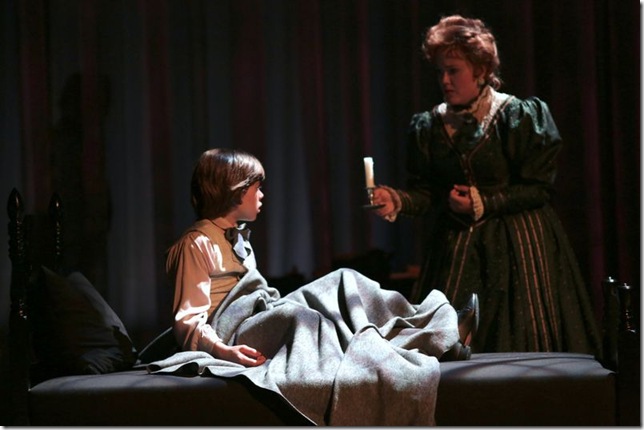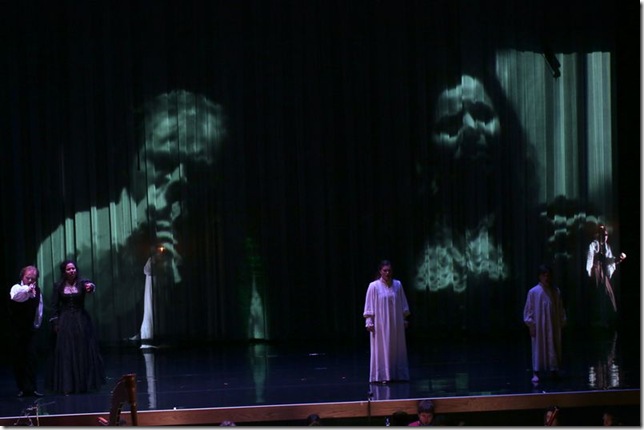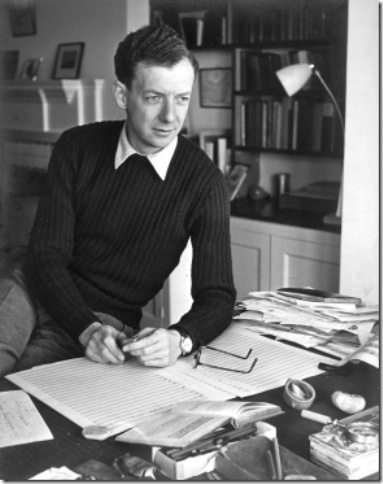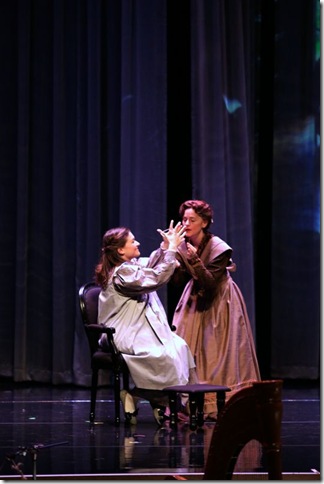Opera has a great bounty of composer anniversaries this year, with the 200th birthdays of Giuseppe Verdi and Richard Wagner, and the 100th anniversary of the birth of Benjamin Britten.
Britten had what would today be considered a relatively short life, dying at age 63 in 1976 after several years of heart disease-related decline, perhaps exacerbated by a bout of syphilis. He was the fair-haired boy of British music in the early to middle years of the past century, and he singlehandedly restored his country to the ranks of the operatically significant with his 16 works in that form; perhaps the most important of them are Peter Grimes (1945), Billy Budd (1951) and Death in Venice (1973).
Others would include 1954’s The Turn of the Screw on that list. A chamber opera based on an 1898 ghost story by Henry James, the opera tells the story of a dual haunting: two children are pursued by two spirits in an English country estate in the middle of the 19th century.
It is a masterfully written opera that perfectly expresses the enormous sophistication, psychological unease and sinister motives of James’ story (Britten set another of the Anglo-American writer’s tales in 1971, with Owen Wingrave, an opera for television). Scored for 13 instruments and a cast of six singers, it is expertly crafted around a theme and 15 variations. “No other Britten score is so tightly ordered, no scheme of his more imaginatively devised to produce a musically claustrophobic quality,” the musicologist Philip Brett wrote in 1992.
On Friday night and Sunday afternoon, Palm Beach Opera presents The Turn of the Screw in what will be its first-ever fully staged production of an opera cast by the members of its Young Artists Program, and the first production ever mounted by the company at the Wold Performing Arts Center in Boca Raton. The opera will be directed by Doug Scholz-Carlson, the incoming artistic director of the Great River Shakespeare Festival in Winona, Minn., and conducted by Greg Ritchey, Palm Beach Opera’s chorus master.
The production is also the first collaboration between the 51-year-old company and Lynn University, whose Conservatory of Music will supply the orchestral players for the two performances. The opera will be presented with the aid of visual projections behind a spare set, a technique Scholz-Carlson employed when he directed this opera for Wisconsin’s Madison Opera in 2010.
The story of the opera, crafted from James’s story by Myfanwy Piper, concerns two children, Miles and Flora, orphans who are left by their uncle in the care of a governess at a family estate. The young governess who comes to take over the job at the beginning of the opera soon sees the ghosts of Peter Quint, the estate’s deceased valet, and Miss Jessel, its late governess, and realizes they are after the children.
“At its very core, it’s about what we can possibly know, our limited perspective on reality; that we can only see the world from our own perspective, and we don’t know whether that’s true or not. We only know what we can see,” Scholz-Carlson, 45, said of the opera Saturday, speaking after a run-through in the company’s West Palm Beach rehearsal hall. “As far as the story is told, we don’t ever find out whether those ghosts exist, or whether they exist only in the governess’s head … We know (only) what each character believes is true.”
It’s also about the parenting of children, said Scholz-Carlson, father to three daughters himself.
 “It’s about what these two children need from parents and how they never get it. They keep on being denied that,” he said. “Their real parents die, so they lose them. They have an uncle who doesn’t really take care of them, and is not interested in taking care of them. They’re put on this estate, and they have Quint and Jessel, who in some ways may be the best parents they have, or may be abusing them.
“It’s about what these two children need from parents and how they never get it. They keep on being denied that,” he said. “Their real parents die, so they lose them. They have an uncle who doesn’t really take care of them, and is not interested in taking care of them. They’re put on this estate, and they have Quint and Jessel, who in some ways may be the best parents they have, or may be abusing them.
“We have Mrs. Grose (the housekeeper), who is potentially a really good mother to them, but doesn’t feel socially that she’s in a place to do it … and then finally the governess comes into it, and she attempts to be that good parent, but she needs so much from the kids. She’s not in a position to have a parent-child relationship. She wants to have a relationship of equals, which is probably the problem Quint and Jessel had, too.
“These poor kids are just lost,” he said.
That squares with the view held of Miles by the young singer portraying him, 13-year-old Sidney O’Gorman, a seventh-grader at the Bak Middle School of the Arts in West Palm Beach. Miles is “a very stressed little boy” who needs love in his life, and is not sure where to get it, he said.
“Quint is the first real person that loves him and takes care of him,” said O’Gorman, who played Pepiček in Hans Krasa’s Brundibar in 2011, a co-production of Palm Beach Opera and the Young Singers of the Palm Beaches that was directed by Scholz-Carlson.
Miles also doesn’t have much of a relationship with his sister. “Flora’s just a playmate with him. Sure, they’re related, but I think that he needs someone else to talk to,” said O’Gorman, who hopes to study theater at the Dreyfoos School for the Arts when he enters high school.
The role of the governess is being sung by soprano Bonnie Sherman Brown, 28, a graduate of Vanderbilt and the Manhattan School of Music who began her musical life in her native Jackson, Miss., as a violinist before taking up voice seriously while pursuing her master’s in New York. “I just love the physical feeling of singing,” she said of her career move, which brought her to Palm Beach Opera’s program not long after she finished her studies at the Manhattan School. “There’s something about the human voice, that when it’s good singing, you can connect with it on such a deep level.”
Brown’s background as a violinist helped with her navigate some of the trickier parts of Britten’s demanding score, which struck her as “very difficult” when she began work on it.
”I think that when it all comes together, it makes sense. It just makes sense. He’s written everything in the score; it’s just such a smart, well put-together work,” she said. “From the stage directions to the tiniest dynamic instruction, it’s all there, and it all contains the drama of the story as well.”
The toughest thing for Brown to master, she said, was the rhythmic complexity of the score. “Because so much of it is you’re coming in on the off beat, and you’re in a different meter than Peter Quint, and then Miles is singing too … that last scene is really tough to negotiate.”
Singing the governess required Brown to think about the veracity of what the governess is seeing at the estate, but not to make a final decision on it.
“She just wants to do good, and to be seen as a good person. And she wants to be seen as a kind of savior figure who can come in and help these poor children that have had such a horrible past,” Brown said. “Because I do believe all the bad stuff (in the opera) happens. There’s the question: is she just making up the entire thing? And I don’t know if I will answer that. I don’t know … I can’t decide if she’s crazy.
“And I came to the conclusion that if she is crazy, she’s not thinking that she’s crazy …. You can look at her as an evil person who destroys everything, or you can see her as someone who was the only sane person in the house,” she said.
The other Young Artists in the production are tenor Kyle Erdos-Knapp as Quint, mezzo Shirin Eskandani as Miss Jessel, mezzo Megan Marino as Mrs. Grose, and soprano Alexandra Batsios as Flora. Eskandani, a Canadian singer born in Tehran, has spent two years in the Young Artist Program and credits it with helping her land upcoming work at New York’s Caramoor Festival.
“It’s been wonderful … It’s intense and it’s a lot of work, but the hands-on experience that you get is quite amazing,” said Eskandani, adding that the Kravis Center itself, where the opera company does most of its performances, is among “the most generous performance spaces I’ve ever sung in.”
“Second of all, the (shows) that they get here are really well-cast, and the staff we get to work with have all very different types of personalities, and different types of experience. And as a young artist that’s very, very important, to see who you’re going to be working with and what a real job is going to be like,” she said. “And that’s what an apprentice program is supposed to be like.”
The Turn of the Screw is set for 7:30 p.m. Friday and 4 p.m. Sunday at the Wold Performing Arts Center, Lynn University, Boca Raton. Tickets start at $45. Call 833-7888 or visit pbopera.org.



